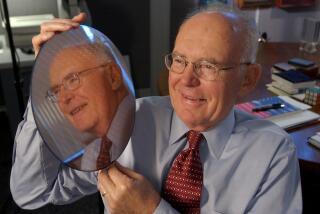Backed Airline Mergers in ‘70s : Ex-CAB Chief Secor Browne, 69, Dies
- Share via
BOSTON — Secor D. Browne, who headed the Civil Aeronautics Board from 1969 to 1973 and was one of the first to speak out in favor of airline mergers, died Sunday. Recently he had become a strong critic of 1978 legislation that deregulated the airline industry.
He died at New England Deaconess Hospital after a long illness. He was 69.
President Richard M. Nixon recruited Browne in 1969 as assistant secretary of transportation for research and technology, later naming him to head the CAB.
The appointment came amid an economic recession in the industry. By 1971 Browne said the airline industry had “essentially turned the corner.”
On first taking office, Browne said he believed the time had come to “re-examine our transportation philosophy” regarding mergers and suggested that laws be rewritten to allow mergers between airlines, truckers, bus companies and railroads.
Under Browne, the agency also granted significant fare increases and authorized American, TWA and United to effect a 12-month cutback in flights on four major east-west routes to reduce huge losses. The agency had never before permitted competing airlines to carry out an agreement controlling flight frequencies.
He also spearheaded a move to make lower charter fares available to all passengers rather than only those belonging to special groups.
Native of Chicago
Browne was born in Chicago and graduated from Harvard in 1938. After serving in World War II as an air communications officer, he worked in the industrial instruments business and in 1955 founded his own company in Waltham, Mass.
He also was an associate professor of air transport at the Massachusetts Institute of Technology.
He returned to teaching and consulting work after leaving the CAB.
More to Read
Inside the business of entertainment
The Wide Shot brings you news, analysis and insights on everything from streaming wars to production — and what it all means for the future.
You may occasionally receive promotional content from the Los Angeles Times.








